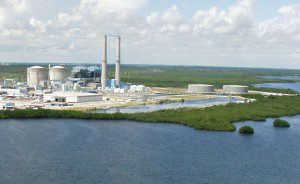
The state Office of Public Counsel represents millions of Florida Power & Light customers in often-arcane utility issues.
But as state regulators heard arguments Monday in a battle about FPL’s electric rates, they faced an unusual question: Should they approve a settlement agreement if the Office of Public Counsel vehemently opposes it?
The Office of Public Counsel has spent more than three months trying to kill the proposed settlement, which was reached by FPL and some major power users and would increase base electric rates next year. Deputy Public Counsel Charles Rehwinkel said Monday the office was participating “under protest” in the hearing before the Florida Public Service Commission.
But FPL representatives — including a former Public Service Commission chairman who is a consultant for the utility — said the Office of Public Counsel should not have veto power over a settlement that they said would benefit customers and the company.
“Because the public counsel is or is not a signatory (to the settlement) is not determinative of whether the settlement is in the public interest,” said Terry Deason, the consultant who spent 16 years on the Public Service Commission and served as its chairman twice.
The Public Service Commission is scheduled to hear as many as three days of testimony this week about the proposed settlement and likely will decide in December whether to approve it. The issue stems from an agreement that FPL announced in August with representatives of industrial power users, hospitals in south Florida and federal agencies such as military bases.
FPL originally filed a rate proposal early this year that called for increasing base rates by $516.5 million in January 2013 and another $173.9 million in June 2013 when a new Cape Canaveral power plant starts operating.
The proposed settlement, however, calls for a $378 million base-rate increase in January 2013 and an additional $165.3 million in June 2013 for the Cape Canaveral plant. It also would allow increases after new plants start operating in Riviera Beach and Port Canaveral in 2014 and 2016.
In seeking approval of the settlement, FPL says its customers would continue paying the lowest electric bills in the state in 2013. While base rates would go up, the increases would be largely offset by lower power-plant fuel costs — another part of customers’ bills.
FPL says residential customers who use 1,000 kilowatt hours of electricity would see their bills go up less than $1 a month in 2013. Also, the original rate filing early this year could have led to hefty rate increases for large electricity users, but the proposed settlement would prevent such increases.
But the Office of Public Counsel, which is backed by other groups such as the Florida Retail Federation, has argued that the utility’s base rates should decrease — not increase. — by as much as $253 million. One of the key issues in the case is that the settlement would allow FPL to earn a 10.7 percent “return on equity,” a closely watched measure of profitability.
“This case is about FPL’s earnings,” said Robert Scheffel Wright, an attorney for the Florida Retail Federation. “FPL does not need any base rate increase to fulfill its duty” to provide safe and reliable electric service.
But Jon Moyle, an attorney for the Florida Industrial Power Users Group, which signed on the settlement, said the proposed four-year agreement is fair and would provide certainty to businesses.
“A settlement is give and take,” Moyle said. “There are a lot of pieces to it.”
Shadowing the hearing is the dispute about whether the Public Service Commission should approve a settlement opposed by the Office of Public Counsel, which is designated by law to represent utility customers. Associate Public Counsel Joseph McGlothlin, for instance, said FPL reached the settlement with a “relative smidgeon of customers.”
The Office of Public Counsel asked the Florida Supreme Court to block regulators from considering the proposed settlement but was unsuccessful. FPL General Counsel Wade Litchfield told the Public Service Commission that the public counsel’s positions in the case “are essentially intended to take the company to the financial edge.”
“This is a very important case for Florida Power & Light Co. and for its customers,” Litchfield said.
by Jim Saunders


